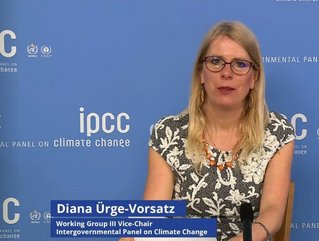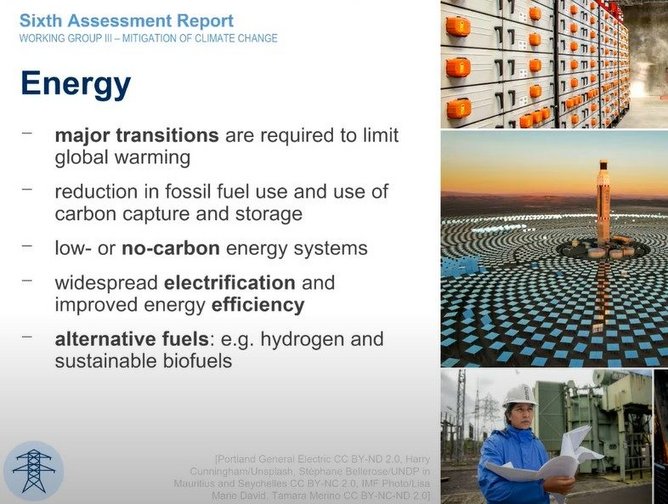Digital technology key to energy efficiency says IPCC

Energy efficiency and reductions in energy consumption can be achieved using digital technologies, according to Diana Ürge-Vorsatz, Working Group III Vice Chair at the Intergovernmental Panel on Climate Change (IPCC).
She highlighted how power can be generated by multiple localised energy networks rather than one main electricity grid, as the IPCC released its Working Group III report, Climate Change 2022: Mitigation of climate change, which outlines the urgent changes in corporate and consumer behaviour required to stem rising carbon emissions.
"This will involve a substantial reduction in fossil fuel use, widespread electrification, improved energy efficiency, and use of alternative fuels (such as hydrogen)," she said, commenting on the energy policies which need to be accelerated.
Since 2010, there have been sustained decreases of up to 85% in the costs of solar and wind energy, and batteries. An increasing range of policies and laws have enhanced energy efficiency, reduced rates of deforestation and accelerated the deployment of renewable energy.

Her comments followed an emotive opening address from António Guterres, IPCC chairman and UN Secretary-General, who said fossil fuel investment was "moral and economic madness" and investing in carbon energy was "adding fuel to the flames".
IPCC Working Group III Co-Chair Jim Skea said it's "now or never" if we want to limit global warming to 1.5°C (2.7°F). "Without immediate and deep emissions reductions across all sectors, it will be impossible," he said.
The industrial sector accounts for about a quarter of global emissions. Achieving net zero will be challenging and will require new production processes, low and zero emissions electricity, hydrogen, and, where necessary, carbon capture and storage, the IPCC states.
Cities and other urban areas also offer significant opportunities for emissions reductions. These can be achieved through lower energy consumption (such as by creating compact, walkable cities), electrification of transport in combination with low-emission energy sources, and enhanced carbon uptake and storage using nature.
Michelle You, co-founder and CEO of Supercritical, said the IPCC report has, for the first time, been unequivocal on the critical role of carbon dioxide removal (CDR) in hitting net zero, but doesn’t go far enough in pressing the 'panic button' for scaling permanent sequestration solutions. She said in any scenario of decarbonisation, we will need permanent carbon removal.
“The report states we need to scale direct air capture to ~310 gigatonnes of removal between now and 2100, from its standing start of thousands of tonnes," she said.
“Investing in carbon removal, as recommended by the report, will help these emerging technologies to develop, scale and have a widespread and meaningful impact on our global carbon footprint. We need regulation that clearly states that only permanent carbon removal counts towards net zero claims. Understating the importance of this means the report has missed its opportunity to encourage action.”
Smarter data-driven technologies vital for energy decarbonisation
Sanjay Neogi, Head of UK and Europe at Enzen, welcomed the report and its spotlight on energy systems, but warned we cannot underestimate the work that needs to be done.
"While energy firms have been laying the groundwork in starting the transition, accelerating the use of digital technologies and the inclusion of renewables into the grid will require significant financial and policy investment from our government," he said.
He added that the research and development tax credits scheme detailed in the recent Spring Statement is a good example of support for innovation in the sector, but we need a quicker and more robust process of bringing technology to market.
"We’re facing greater urgencies, with sky-high energy bills and the climate emergency as apparent as ever," he said.
"We hope that the government’s long-awaited energy strategy, due out this week, will provide energy firms with the tools to advance and prepare our energy systems for a more diverse and resilient future. This must include a way forward for smarter, data-driven technologies, allowing for the successful integration of sustainable energies to support the UK on its journey through the energy transition."
A recent survey by ENGIE Impact highlighted that only 38% of global business leaders overall strongly agree they understand the relevant technologies for decarbonisation, with just 14% expressing confidence in combining evolving solutions into their decarbonisation plans. The survey also found that companies’ confidence in their strategy of decarbonisation technologies declines as they move from planning to execution.
"That said, to implement and accelerate decarbonisation within organisations, business leaders shouldn’t necessarily need to wait around for the ‘perfect’ technology or data," said Mathias Lelievre, CEO at ENGIE Impact.
"Rather, it’s about having an efficient carbon reporting infrastructure in place and making use of existing data to capture and address carbon output. This is particularly important for Scope 3 emissions, as they often represent the majority of a company’s carbon footprint and being able to track these can truly chart progress and optimise sustainability investments.
"Having a single source of truth for decarbonisation and emissions data for the whole organisation which can then feed into new technologies needs to be a priority.”
James Forrest, Global Energy and Utilities lead at Capgemini, said it is now "crystal clear" the global economic benefit of limiting warming to 2 degrees Celsius is ultimately greater than the cost of mitigation - and yet just one in five organisations have set science-based emissions targets.
"Organisations must 'Commit, Act, and Monitor' – three simple steps to move faster in their sustainability journey by leveraging technology tools and the know-how required to limit warming," he said.
“It really is now or never, and consumer behaviour must also change. This is one of the easiest leavers to pull while we improve our energy efficiency response, everyone has a duty to take measures like reducing thermostats or their method of transport. After all, the greenest energy is the energy we don’t use.”






